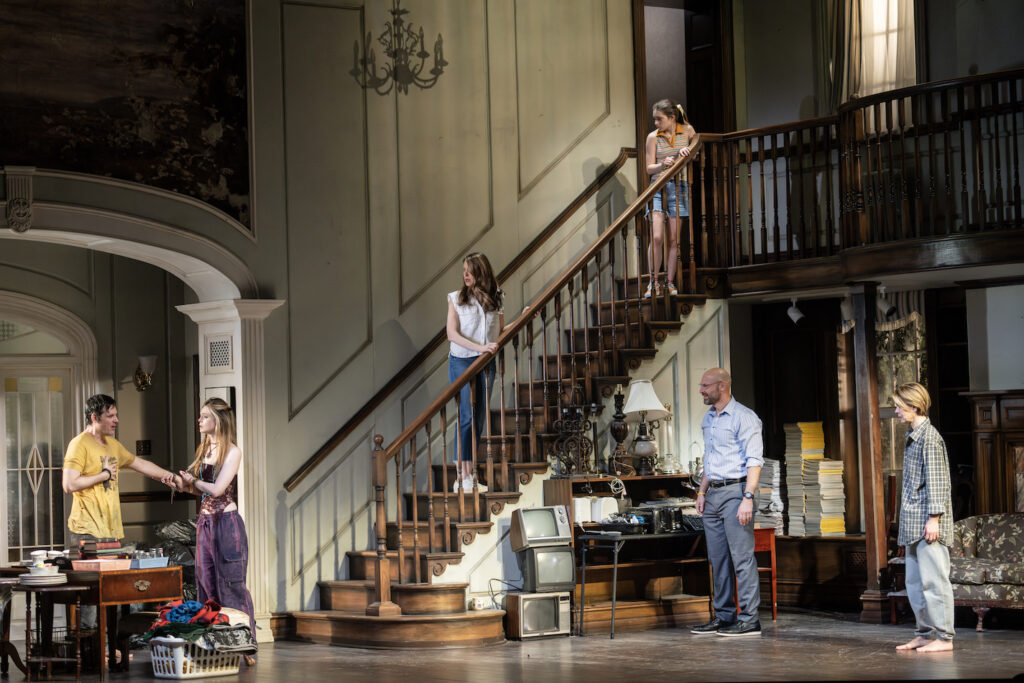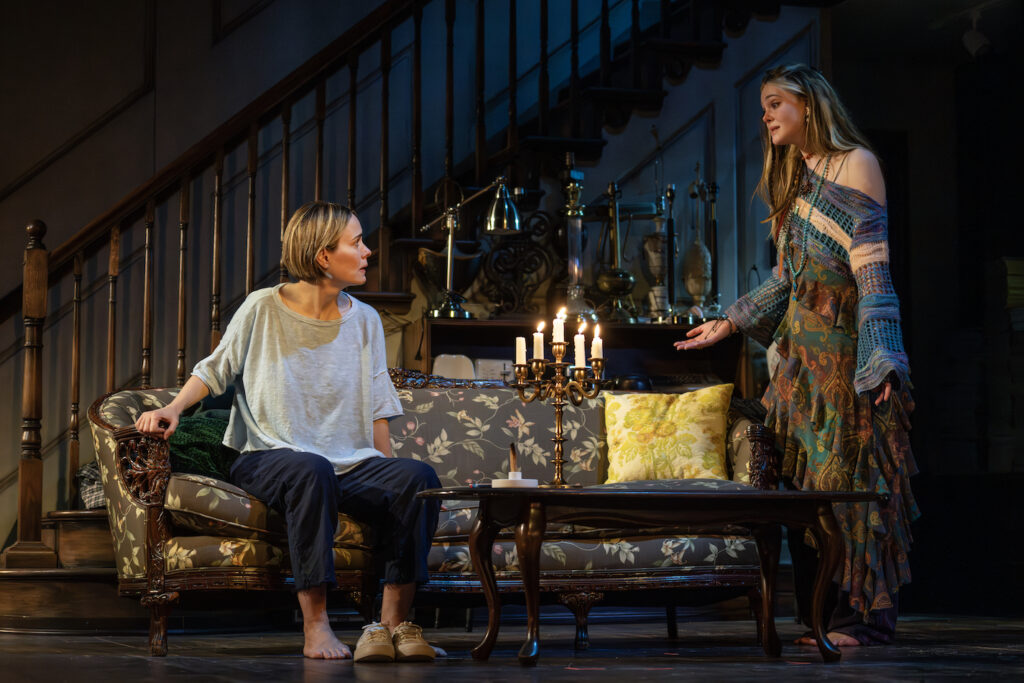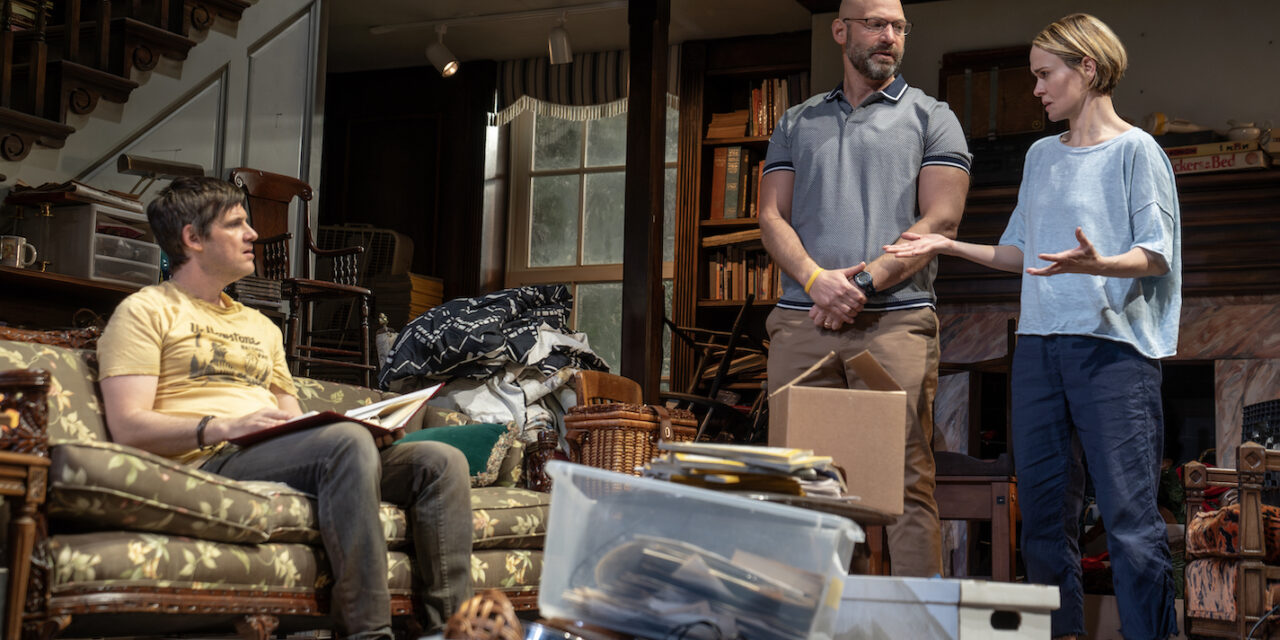Theater Review by Stuart Miller . . . .
Half a block from The Hayes Theater we could see Sarah Paulson’s hostile glare radiating anger from the marquee. “I would not want to end up on her bad side,” I said to my son. We soon found out that in Branden Jacobs-Jenkins’ Appropriate (now playing on Broadway at the Hayes Theater)—an American horror story about family dysfunction exacerbated by the lingering ghosts of slavery, lynchings and racism—everyone, except her recently dead and naively idealized father, is on her bad side.
Paulson plays Toni, the oldest of three siblings, all hurting in different ways as they gather to sort through their father’s remains and the estate—which happens to be on an old plantation that includes a slave burial ground. As William Faulkner noted, “The past is never dead. It isn’t even past.” And here nothing stays buried, whether it’s the sonic onslaught of cicadas as they emerge from the ground as part of their thirteen-year cycle (which opens the show), or every family secret large and small, or America’s legacy of hate and abuse.

Jacobs-Jenkins has called attention to the fact that plays like A Raisin in the Sun are called plays about race, while those by Eugene O’Neill, Arthur Miller and Tennessee Williams are simply family dramas. He set out to write a classic American family drama (he has said he drew some inspiration from watching his mother and aunts bicker after their father’s death); but while the characters are as white as those created by those icons of the American stage, Jacobs-Jenkins (An Octoroon) imbues this family feud with an extra dimension. (The play originally ran off-Broadway in 2014.)
Early in the play, a photo album is found among the patriarch’s possessions containing page after page of lynchings of Black Americans. Despite other physical evidence of his racist past, as well as stories about his racist and anti-Semitic behavior from family members, Toni keeps her head firmly in the sand. Her brothers, Bo and Frank, react according to their own agendas too, as this documentary proof of America in action tears the family apart.
Director Lila Neugebauer’s casting is perfect, placing talented actors in roles that resonate with their public personas.


Paulson (TV’s “American Horror Story” and “Ratched”) conveys Toni’s brittleness and perpetual state of pique, keeping her family and the audience on edge. Corey Stoll (Showtime’s “Billions”) plays Bo, who is resentful about Toni being the executor of the estate and so focused on his own money woes that he worries less about everyone’s inappropriate behavior and more about how to appropriate (yes, the play’s title has multiple meanings) and capitalize on these images of Black pain and suffering. As Rachael, Bo’s “Jew wife” (as the father supposedly called her), Natalie Gold (HBO’s “Succession”) is a reminder that family dysfunction and fighting over money and power is an American pastime.
Stage veteran Michael Esper (American Idiot) doesn’t have the TV resume, but his empathetic performance as the youngest sibling, Frank—who has re-named himself “Franz” as part of an effort to start anew (or hide from his sordid past), creates an intriguing friction as it becomes clearer that his recovery and redemption efforts are not as pure-hearted as they seem. And, as Tina’s troubled son, Rhys, Graham Campbell makes some quirky choices, giving his underwritten character a distinctive flavor.


River, Franz’s much younger fiancée (Elle Fanning, solid in her Broadway debut), is both a blindly supportive New Age hippie in recovery herself and the sharp-minded daughter of lawyers. The unresolved contradictions in her character, unfortunately, don’t represent complexity so much as they are one of the few places where Jacobs-Jenkins’ script stumbles. He also occasionally settles for quick or cheap laughs (one at the expense of River’s outfit, another with an overused running joke about Bo and Rachael’s 13-year-old daughter insisting she’s practically a grown-up).
There are also moments where the themes seem a bit muddied; but, as the family self-destructs it is clear that change is painful and progress difficult and hard-won—and whether Jacobs-Jenkins believes we need to break from the past or first honestly dissect and discuss it, the play is engrossing, entertaining (and often funny) and thought-provoking. The pacing is crisp, the set (by the design collective “dots”)—the lived-in (and died-in) old plantation burdened by all the family’s possessions—is excellent and the ending, a unique whirlwind through time that’s the theatrical equivalent of a brilliantly directed movie montage, is more fodder for conversation without providing tying everything up too neatly. For a play about problems both personal and societal that defy easy answers, it’s an appropriate finish.
Appropriate. Through March 3 at The Hayes Theatre (240 West 44th Street, between Seventh and Eighth Avenues). Two hours, 45 minutes with one intermission. www.2st.com
Photos: Joan Marcus
Cover Photo: Michael Esper, Corey Stoll and Sarah Paulson


















